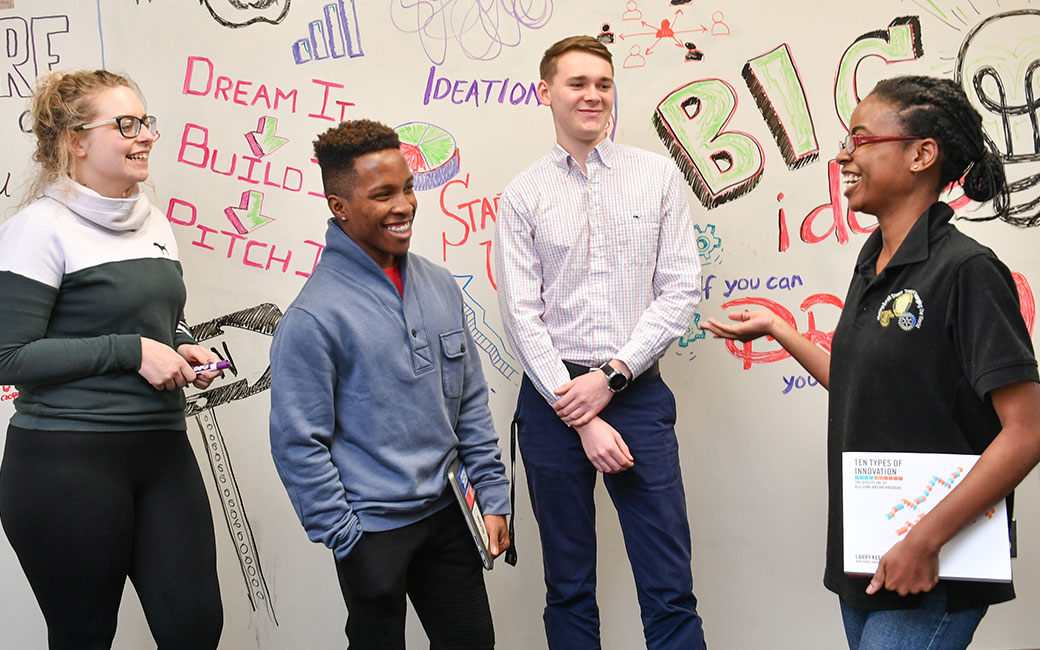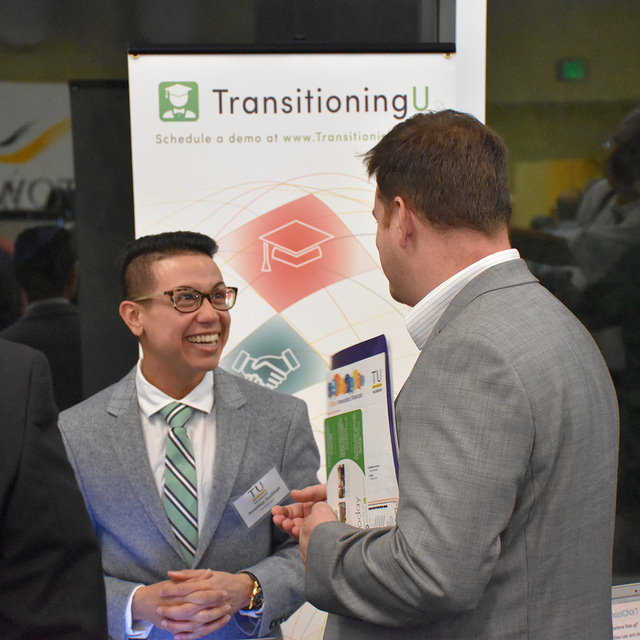
Ryan Perpall ’19
A Student Launch Pad EiT and founder of BreakBox
Providing space, resources and mentorship, TU supports budding entrepreneurs

When she graduates from Towson University this spring, Sierra Cossou isn’t looking forward to having a job. In fact, she’s never really wanted one.
But it’s not because the mass communication major doesn’t have any plans for her future. Quite the contrary, she knows exactly the path she wants to take after receiving her degree.
“I always envisioned myself having a business of my own,” Cossou said. “That’s why I joined the entrepreneurship minor, to learn about what it takes to be a successful entrepreneur so I could eventually apply it to my own business.”
Cossou is one of the hundreds of students who are taking advantage of the entrepreneurship programs offered by Towson University. She is part of the entrepreneurship minor, offered by the College of Business & Economics to non-business majors. CBE also offers its students a business administration major with a concentration in entrepreneurship.
For Jan Baum, director of the entrepreneurship minor, Cossou is a perfect example of what TU is trying to do with the minor: open up the idea of entrepreneurship to everyone.
“That’s the big-ish picture,” Baum said. “We are standing up entrepreneurship on campus. And if we’re successful, we will instill an ethos of entrepreneurship and entrepreneurial mindsets in people across campus.”
This ethos is the foundation of CBE’s Center for Innovation and Entrepreneurship (CIE), a world-class interdisciplinary entrepreneurship center with a startup culture and a focus on real world application to empower economic and social growth through Towson and metro Baltimore.
To support students and entrepreneurs in the region alike, TU is committed to bringing together all of the university’s resources to help foster entrepreneurial talent, ideas and opportunities on campus and beyond through programming and the infusion of innovative thinking across campus, including the team, networks, and resources of Towson University’s robust business incubator.
“There is such a huge opportunity for our students here,” said Frank Bonsal, director of venture creation in TU’s Division of Innovation and Applied Research. “Whether a student actually builds a company or just sees a problem they want to tackle, these programs give them motivation in their studies that they can harken back to later. That’s our role here at Towson University — to expose students and provide them with these experiences.”
There are over a dozen experiential learning programs offered by the CIE. A few examples include:
It was CIE’s competitions that allowed Cossou to focus on “MallMate” — a food delivery service that would bring food to in-demand retailers, so they wouldn’t have to leave their stores unattended and have a lunch break.
With “MallMate,” Cossou won both the Big Idea Poster and the Tiger Cage competitions — winning $500 and a free consulting package for her small business. And while it was a nerve-wracking experience, she’s happy seeing her work in the minor paying off.
“Winning gives me a sense of reassurance that I’m on the right path and an extra push to keep going,” Cossou said. “All of these things are giving us real-life experience outside of the classroom that we really need and benefit from.”
To support these programs and competitions, Towson University Venture Creation developed the Student Launch Pad in 2014. Located on the fourth floor of Cook Library, the Student Launch Pad provides student entrepreneurs the opportunity to develop their ideas and business plans with the help of fellow students and entrepreneur mentors.
The Student Launch Pad helps to strengthen students’ entrepreneurial prowess and innovative thinking skills with free interactive programs, events and competitions open to the entire campus. Along with a professional staff, the Launch Pad hosts a group of student Entrepreneurs-in-Training (EiT) who serve as ambassadors for the program and are available for one-on-one appointments.
Meet the TU Student Launch Pad’s EiTs
“I really encourage our students to stop by the Launch Pad,” Baum said. “I tell them to come here and talk with us, to let us help them develop their ideas. A lot of people say, ‘I don’t know if this is a good idea, I don’t know if this is feasible.’ So we talk and help them evolve it.
And while TU has continued to grow its focus on student entrepreneurs, it has also become an anchor institution for Baltimore County. This includes supporting partnerships through the BTU initiative as well as supporting start-up ventures through the TU Incubator.
Celebrating its 10th anniversary in 2017, the TU Incubator has supported more than 80 start-up ventures and produced greater than $150 million in economic impact. One of the top 10 largest incubators in the Greater Baltimore region, TU Incubator is focused on technology-enabled services, particularly those that focus on university core competencies, such as education and healthcare.

The TU Incubator currently hosts more than 35 different member companies, and provides these members with first-class facilities, workshops, collaboration and networking opportunities, and access to an exclusive mentor network. Many members have become a vital part of the TU community and bring added value to student programs by serving as Launch Pad advisors, competition judges and class speakers.
“We focus on company support,” Bonsal said. “For the companies that are here and even those that are virtual, we dig in and provide all manner of support. The Incubator is the largest EdTech cluster in Maryland and the DMV, and we’ve been working with some of the leaders of these companies to evolve the education innovation cluster.”
For many student entrepreneurs, joining the TU Incubator is the final step towards starting a business. There are currently two businesses that started in the Student Launch Pad that ended up joining the TU Incubator.
While those are two success stories, for Baum, the goal of the CIE is for its students to start a business and become successful entrepreneurs.
“I’m hoping they feel empowered and have enough opportunity and support to believe in their ideas,” Baum said. “I want them to believe they are creative and believe they can be an entrepreneur.”
And when asked if she had any advice for fellow student entrepreneurs, Cossou’s advice is pretty simple — jump right in.
“Just join the minor,” she said. “There are so many resources available for students to succeed, don’t miss out on them contemplating. You’ll be around like-minded individuals who want you to succeed and will help you do it.”
This story is one of several related to President Kim Schatzel’s priorities for Towson University: BTU: Partnerships at Work for Greater Baltimore